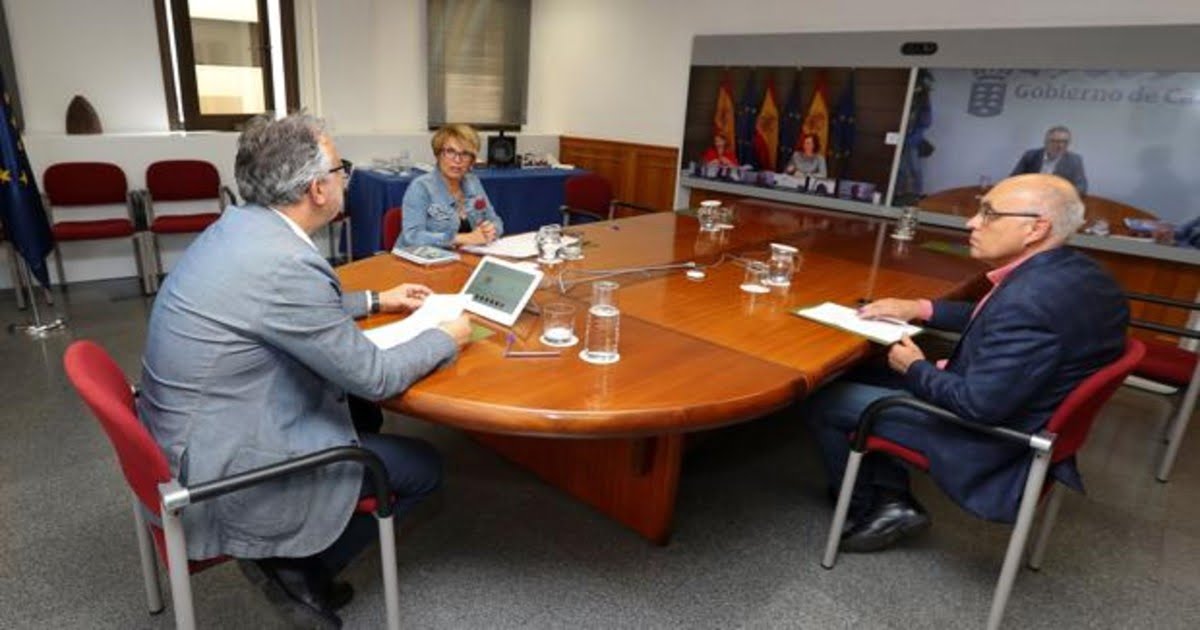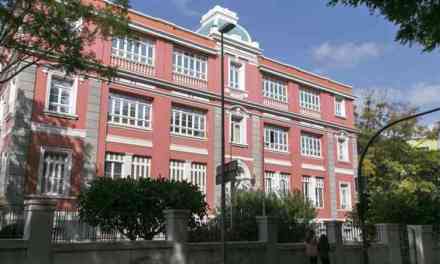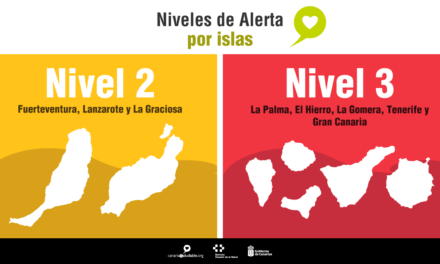 The confirmation was communicated on Monday at a meeting, within the framework of the Economic Management Committee, the regional Minister for Economy, Knowledge and Employment, Elena Máñez; the Minister of Tourism, Industry and Commerce, Yaiza Castilla; the Minister of Agriculture, Livestock and Fisheries, Alicia Vanoostende and the Minister for Social Rights, Equality, Diversity and Youth, Noemí Santana, along with industry representatives including the president of the Canarian Confederation of Entrepreneurs of Las Palmas, Agustín Manrique de Lara, the Spanish Confederation of Business Organizations of Santa Cruz from Tenerife, José Carlos Francisco, and from workers unions UGT Canarias, Águeda Victoria Francisco, and from CCOO in Canarias, Inocencio González.
The confirmation was communicated on Monday at a meeting, within the framework of the Economic Management Committee, the regional Minister for Economy, Knowledge and Employment, Elena Máñez; the Minister of Tourism, Industry and Commerce, Yaiza Castilla; the Minister of Agriculture, Livestock and Fisheries, Alicia Vanoostende and the Minister for Social Rights, Equality, Diversity and Youth, Noemí Santana, along with industry representatives including the president of the Canarian Confederation of Entrepreneurs of Las Palmas, Agustín Manrique de Lara, the Spanish Confederation of Business Organizations of Santa Cruz from Tenerife, José Carlos Francisco, and from workers unions UGT Canarias, Águeda Victoria Francisco, and from CCOO in Canarias, Inocencio González.
For the president of the Canary Islands, Ángel Víctor Torres, an extension of the ERTE “will allow us to respond to the great impact that the health emergency is having on the Canary Islands economy.”
In particular, the President insisted that the paralysis of the tourism sector, “which cannot be reactivated overnight” and which represents 35% of GDP and 40% of employment in the archipelago, stands as the single greatest challenge for the region.
As most will understand Spanish state spending has increased exponentially over the last 2 months to combat and respond to the health crisis, mitigating its social and economic consequences, which are costs that will in turn cause the public debt and deficit to skyrocket to an all-time high.
 Spanish Minister for Work and Social Economy, Yolanda Díaz, yesterday confirmed to the President of the Canary Islands Government, Ángel Víctor Torres, what had already stated in recent days, that is, that the ERTEs due to force majeure will continue to remain in force beyond the declared state of emergency. She was not, at this time however, able to specify exactly for which industries of activities nor for how long the Spanish Government expected the situation to continue.
Spanish Minister for Work and Social Economy, Yolanda Díaz, yesterday confirmed to the President of the Canary Islands Government, Ángel Víctor Torres, what had already stated in recent days, that is, that the ERTEs due to force majeure will continue to remain in force beyond the declared state of emergency. She was not, at this time however, able to specify exactly for which industries of activities nor for how long the Spanish Government expected the situation to continue.
Díaz, who is part of the Unidas Podemos coalition with the socialist PSOE party, had already said last Friday to the Council of Ministers who are guiding the response to the crisis, that this type of ERTE is to be maintained “without a doubt”, much needed respite for tens of thousands of companies throughout Spain and for the workers the employ. Arguably, most needed in the case of the Canary Islands.
The ERTE due to force majeure was originally declared as an ad hoc measure during the State of Emergency which has allowed businesses to suspend work contracts of their employees without being expected to continue to pay their businesses contributions, including unemployment contributions, Salary Guarantee Funds and Vocational Training. So it has been essential in order to avoid mass layoffs, especially within the hospitality sector, where businesses have been completely shut down, representing nearly a quarter of the entire workforce in the archipelago. It is widely agreed that if we are to save a multitude of jobs in tourism, it is essential that these measures stay in place, regardless of how much longer the State of Emergency continues, these businesses still cannot reopen if there are no tourists.
This is why employers and unions on the islands have been insisting that it is vital that the ERTE by force majeure is extended at least throughout the Archipelago, at the very least for tourism companies and is not withdrawn before the end of this year.
The clear line of thinking is simply that until French, Dutch, Italian, Russian and, above all, Germans and British holiday makers can return, not one of the hotels, apartments, holiday homes or other businesses in the sector will be able to reinstate all their workers.
And as this publication has made clear before now, foreign tourists are not really expected to return, at the earliest, before October or November, hence it is essential that these ERTE special measures be extended until at least December 31.
A whopping 150,000 jobs depend on it. However, The delicate situation for the current state public coffers for now prevents Díaz from being able to guarantee any of these measure until the end of the year. Specifying which businesses -beyond accommodation and foreseeably hospitality- to whom the government will continue to apply these regulatory exceptions is also beyond the government’s grasp right now. In any case, it seems many, including the regional Executive, have already taken it for granted that in these sectors, such as the tourism industry, the measure will have to continue to apply.
“Nothing has yet been finalised; we know that it is being negotiated, but neither has the minister specified, nor does it seem that it will be defined, by the Council of Ministers tomorrow,” explained the general secretary of the Tenerife division of the Confederación Española de Organizaciones Empresariales (CEOE), Eduardo Bezares, after the videoconference with Díaz, which was attended by President Ángel Víctor Torres and his advisers including representatives of employers and unions in The Canary Islands.
The Canarian Confederation of Entrepreneurs (CCE)’s secretary general, José Cristóbal García, praised the unity with which the Regional Government has transmitted to the minister the importance for the Archipelago the the extension of ERTE is granted. “The objective was to make them see that the effects of the crisis in the Canary Islands is going to be much greater than in the rest of the country; but now we need to make this happen” said Garcia.
Torres optimistically emphasised his administration’s commitment to extending these special measure, which “will allow us to respond to the great impact that the health emergency is having on the Canarian economy.”
In addition, the Canarian president, reports local press, managed to get Díaz to commit to discussing at a National Roundtable for Social Coordination to discuss the extensions of the ERTE, detailing the specific need of the sectors and the Autonomous Communities that will most severely suffer, which could be a first step towards unilateral agreement to extend the assistance until December 31, at least in the tourism sector.













